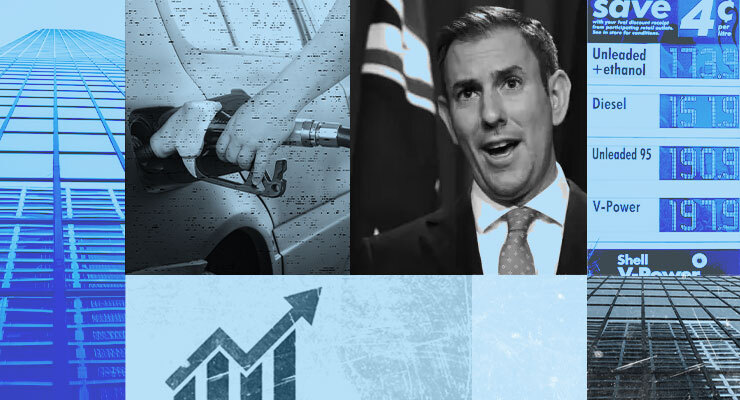
Remember FuelWatch? Jim Chalmers would. It was the result of Kevin Rudd’s campaigning before the 2007 election on high petrol prices.
Rudd promised a national petrol price monitoring scheme that could alert drivers where there was cheaper fuel. It was announced in 2008 amid leaks from Treasury and criticism from the media, but it was defeated in the Senate — and the global financial crisis came along and smashed inflation anyway.
The Albanese government has its own, quite different petrol issue, having also campaigned hard on the cost of living before being elected. It is sticking to the Morrison government’s plan to restore the fuel excise level cut in the budget earlier this year, quite sensibly. The oil price has been falling since June and is well below March levels.
But everyone knows the fuel industry is quick to pass on oil price rises but a lot more sluggish passing on falls. “People are absolutely filthy” about that, Chalmers said in July. He was working with the Australian Competition and Consumer Commission to keep an eye of price gouging by petrol retailers, he said.
Just in case people forgot that, Chalmers has now announced that he wrote to the ACCC in August asking it to be especially vigilant about petrol price rises above the levels justified by the restoration of the full level of the fuel excise.
That is, corporations using the cover of a broader rise in prices to sneak in unjustified price rises that flow straight to profits. There’s been a lot of that going in during the current bout of inflation, as Crikey has explained before.
It’s easier for corporations to do that now because the Australian economy has become more concentrated. We’ve always been a relatively small economy with a limited domestic market in a large country that is prone to oligopolies and monopolies. It’s getting worse.
“Australia’s economy is getting more concentrated over time and, in my view, is already too concentrated,” Rod Sims, then head of the ACCC, said in October last year. A paper from Treasury in June last year quantified the growing concentration in terms of mark-ups.
Sims pushed a significant strengthening of competition laws around mergers as head of the ACCC and has continued to do so since leaving. It’s an issue that Labor’s Andrew Leigh has been talking about for years, too.
Growing concentration is a problem in most developed economies, but especially in Anglophone ones that bought into neoliberal economic reform. It’s a particular consequence of neoliberalism, despite the almost divine attributes that neoliberal economists give to competition. Because neoliberals prefer governments small and weak, the strong competition laws and regulator needed to maintain competition fall out of favour — the only thing neoliberals want to see from governments on competition is selling off government enterprises to the private sector.
And because neoliberal policymaking devolves over time into simply giving corporations anything they claim they need for jobs and investment, the argument from large corporations that they need to be allowed to acquire or merge with others and increase concentration is bought by government and economists — all on the basis that it will generate efficiencies and reduce costs (aka jobs).
Reversing this requires a policy change at least as significant as the one the government is contemplating on industrial relations: allowing sector-wide bargaining, and possibly even making it compulsory. That reverses decades of neoliberal atomisation of the workforce.
A similar historic reversal is required on competition law, not merely to significantly strengthen the ACCC in its power to stop mergers, but to enable it to order the break-up of dominant companies engaging in price mark-ups.
If the government can shift the balance of industrial relations power back in favour of workers against corporations, it should do the same for consumers against corporations. In fact, it may need to to prevent corporations simply using higher wage costs as another excuse to raise prices still further.
And bear in mind “consumers” doesn’t just mean households; it means other businesses that purchase from dominant firms — especially small business.
Rather than merely watching fuel prices, the ACCC should be terrorising Australia’s many concentrated markets, armed with the power to order de-mergers and splits for companies abusing market power — a prospect far scarier for them than another ACCC fine.
Correction: this article originally said FuelWatch had been “implemented” in 2008 but the scheme was only announced; it was never implemented following defeat in the Senate. The text has been amended.








Great article BK. It is fantastic having an erudite deep thinker like Leigh in the government, but let’s see if he has enough clout to start the swing back to favoring worker’s and consumer’s interests over neoliberal profits and greed.
Hear! Hear! I hope Andrew Leigh gets heard by the Cabinet. He is spot in in respect of what we laughably call competition in Australia.
The aim of all business is not free or even fair markets. It’s having a monopoly & a slave workforce. Cap prices, cap profit percentages, cap investor return rates, peg wages to executive pay scales & bonuses.
I’ve been saying for a while that this is an artificial inflation caused by artificial fuel prices. Follow the money…
You can’t go to Coles anymore without seeing Coles branding in every isle with their own versions of popular products as they have started putting competitor brands lower and lower on the shelves; they now own sales, manufacturing and the farms (that they stole during major recession and price wars from family farms). Nothing will ever get done, the government is too weak and politicians are all just waiting for their next payday. Half of them I imagine barely read bills that are introduced and do as they are told.
Great article!